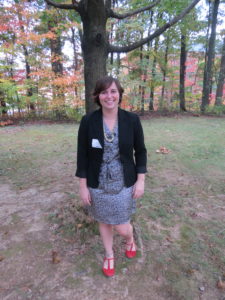 Amelie Rives (junior) recently presented her research topic, “Women, abortion, legislation, and reproductive health care”, at the Public Sociology Graduate Conference at George Mason last month. Amelie’s topic looks at the inequality within women’s health care, the inequalities within reproductive health, and the effect that politics of abortion have on women’s reproductive health. More specifically, through a series of interviews with Roanoke College students, Amelie’s paper “seeks to investigate perceived notions, through the use of qualitative data, about whether Virginia, with some of the strictest abortion laws in the nation, restricts women from obtaining basic reproductive care.”
Amelie Rives (junior) recently presented her research topic, “Women, abortion, legislation, and reproductive health care”, at the Public Sociology Graduate Conference at George Mason last month. Amelie’s topic looks at the inequality within women’s health care, the inequalities within reproductive health, and the effect that politics of abortion have on women’s reproductive health. More specifically, through a series of interviews with Roanoke College students, Amelie’s paper “seeks to investigate perceived notions, through the use of qualitative data, about whether Virginia, with some of the strictest abortion laws in the nation, restricts women from obtaining basic reproductive care.”
Amelie started this research project as part of her research methods class she took with Dr. Shannon Anderson. She then worked on it as an independent study and submitted it when the call for proposals came out for the George Mason conference. This was Amelie’s second time presenting at a conference, this past spring she presented at a conference in Baltimore with her Anthropology 380 class but as she explains, “this time was different because it was my own data, not an entire class”. Amelie was one of four undergraduates at this conference and she presented her paper in the form of a round table discussion where she was given feedback on her paper.
Amelie plans to continue her independent study next semester due to her love for the topic and good relationship with her faculty mentor, Dr. Anderson. Dr. Anderson points out that working with Amelie has been great, “she is enthusiastic, intelligent, and has tons of energy…these are the qualities we as faculty love when working with students like Amelie.”
For students considering research opportunities, Amelie advises that “if you are interested in it, totally look into it, even if you’re not a science major. When you do your own research you give yourself the freedom to do what you want because you are invested in the topic.” Dr. Anderson also advises that if students “have the opportunity and there is a faculty member that they like, then jump at it! Research opportunities give you a sense of what everyone here is doing…it allows students to understand that they can participate in creating knowledge.”